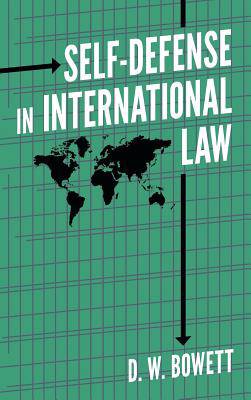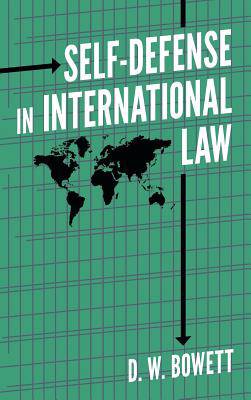
- Retrait gratuit dans votre magasin Club
- 7.000.000 titres dans notre catalogue
- Payer en toute sécurité
- Toujours un magasin près de chez vous
- Retrait gratuit dans votre magasin Club
- 7.000.0000 titres dans notre catalogue
- Payer en toute sécurité
- Toujours un magasin près de chez vous
Description
Self-defense and the right to go to war. Originally published: New York: Praeger, [1958]. xv, 294 pp. Bowett observes that the use or threat of force by any state can be a delict, an approved sanction, or a measure taken in self-defense. He examines the evolution of self-defense doctrine in the nineteenth and early-twentieth centuries, with the assumption of the existence of a state's unlimited 'right' to go to war. He then attempts to outline the limited and provisional effects of this right under the U.N. Charter. This book was written after Bowett's term as a United Nations legal officer from 1957-1959. "Throughout the work there is a refusal to dogmatize or to state in absolute terms any aspect of the 'privilege' of self-defence in its present context. (...) [Bowett] is to be congratulated on producing a timely and scholarly survey of one of the most fundamental, and often abused, sovereign rights known to international law." --K.R. Simmonds, British Year Book of International Law 34 (1958) 432. SIR DEREK WILLIAM BOWETT [1927-2009], an international lawyer, was President of Queens' College, Cambridge from 1969-1982 and Whewell Professor of International Law, Cambridge, from 1981-1991. He was awarded a CBE in 1983 and a knighthood in 1998. He is the author of The Law of International Institutions (1963), United Nations Forces: A Legal Study (1964), The Law of the Sea (1967), The Search for Peace (1972) and The International Court of Justice (1996).
Spécifications
Parties prenantes
- Auteur(s) :
- Editeur:
Contenu
- Nombre de pages :
- 314
- Langue:
- Anglais
Caractéristiques
- EAN:
- 9781584778554
- Date de parution :
- 16-05-14
- Format:
- Livre relié
- Format numérique:
- Genaaid
- Dimensions :
- 152 mm x 229 mm
- Poids :
- 630 g

Les avis
Nous publions uniquement les avis qui respectent les conditions requises. Consultez nos conditions pour les avis.






